October 2008 | While endlessly fantasizing about The Next Big Thing in the wondrous world of consumerism can be inspiring, execution beats everything. Which is why an easy-to-apply trend like the rising importance of perks and benefits should be on your radar this month and beyond.

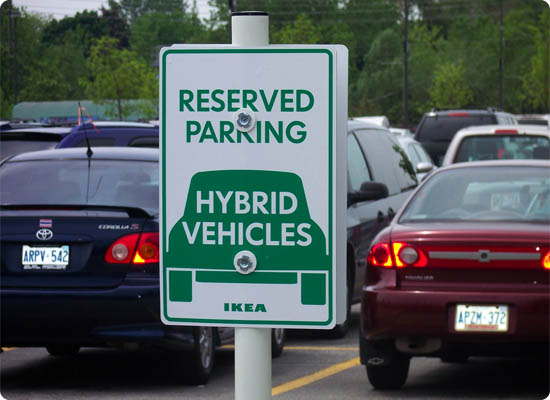
Consumer infatuation with perks and privileges isn't new. For years, airlines, hotels, credit card companies and private banks have been cleverly rewarding their most valuable customers with surprises, status symbols and convenience.
But as we move towards a consumer society that’s based more on experiences, on status stories, on the ephemeral—and in which, for many, time is now the only true scarcity—expect perks and privileges to become an integral part of every B2C industry and sector.
We’ve dubbed this trend PERKONOMICS:

PERKONOMICS: A new breed of perks and privileges, added to brands' regular offerings, is satisfying consumers’ ever-growing desire for novel forms of status and/or convenience, across all industries. The benefits for brands are equally promising: from escaping commoditization, to showing empathy in turbulent times. One to have firmly on your radar in 2009.
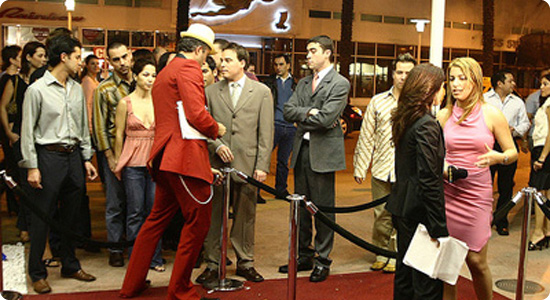
What constitutes status in a consumer society is forever evolving*. One of the current major status shifts? Exclusive access to privileges and experiences (from eco to luxury) dethroning exclusive access to physical symbols. And yes, PERKONOMICS plays directly and effectively to this shift.
* Please re-read STATUS SPHERES for the various traditional and new forms of status, as well as STATUS STORIES, THE CONVENIENCE ECONOMY and BRAND BUTLERS.

Time—that is, the lack of it—is still one of the biggest consumer trends around. Anything that you can do to help save consumers' precious time is worth its weight in, well, long lazy uninterrupted days. And that includes not wasting people’s time, too ;-) Some stats:
- 70% of Americans 16 years and older say they don’t have enough time to do all the things they need to do. Half of US consumers now say that a lack of time is a bigger problem in their lives than a lack of money. (Source: Yankelovich.)
- 43% of Americans, 39% of British, 60% of Dutch and 47% of Australians rate themselves as ‘time poor’, meaning they feel short of time. (Source: J. Walker Thompson.)
- Americans are critically under-vacationed. That's both by choice and circumstance, at least according to the results of Expedia's annual Vacation Deprivation Survey. Americans had only 14 days off in 2007. Yet 35% of Americans won't take all the time off they earn, returning upward of 438 million days to their employers. (Source: Expedia.)
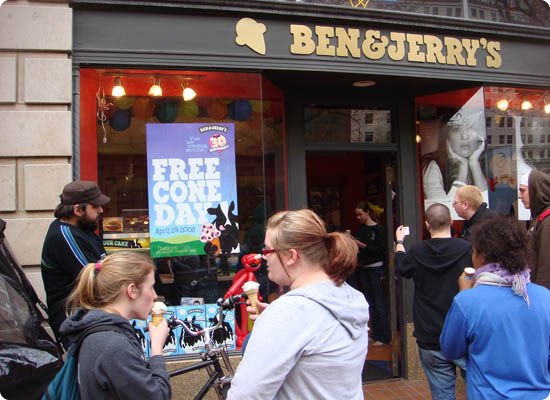
What's your equivalent of Ben & Jerry's annual Free Cone Day?
Empathy with your customers' hassles and struggles should be a top-priority no matter how the economy is doing, but when things get really tough (like, well, now, in many countries), an extra scoop of FREE LOVE, or really any gesture of kindness and understanding will be truly appreciated. Doesn't take years of business school to figure this one out ... just show some heart.
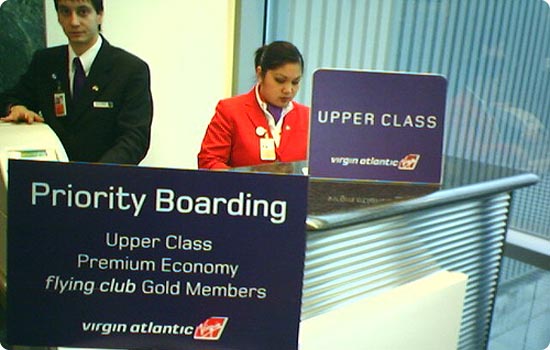
Who to learn from? PERKONOMICS pioneers* obviously include airlines, hotels, credit card companies and private banks, who have always been big on all kinds of loyalty programs and privileges. From priority lines to "no middle seat" guarantees, and from upgrades to discounts on flights, holidays and concerts.
So for those who want to dive deeper into PERKONOMICS after reading this briefing, study the various perk-based initiatives and countless articles and books that cover the dos and don'ts of traditional loyalty programs and rewards. Then either translate those established insights into new perks for anything that is not an airline, hotel or bank, or come up with a novel approach for the incumbents. Easy, right?

Google’s massage cabanas
*As always, we’re focusing on B2C, so we’re leaving out perks in the workplace. However, there’s plenty of inspiration to be had from studying the perks that employees (who are consumers, too) most enjoy. Start with the 21st century champ of workplace perks: Google.
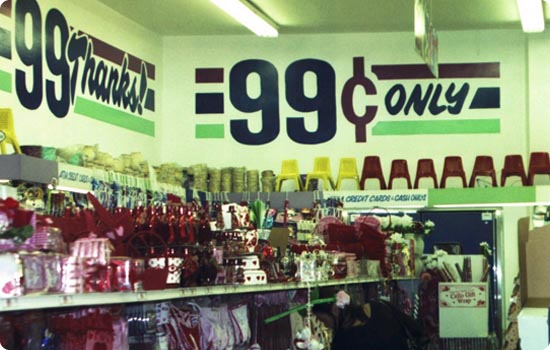
Don’t join the race for the bottom
So… If you deliver two major benefits that your customers clearly crave—status and convenience—what’s in it for you, as a business professional or as a brand?
Well, how about:
- Perks bring much-needed love (if not FREE LOVE), in upturns and downturns, potentially leading to more ‘brand love’.
- Perks help commodity-like industries stand out by conferring a (renewed) sense of uniqueness. Adding perks often requires the ability to partner with other products or services, so brands with the best partnering skills—and therefore access to the best exclusive offers—will win.
- Perks, when done well, foster customer loyalty.
- Perks can give you the leading edge when it comes to attracting first-time customers.
- Perks can make for great if not invaluable PR; customers will tell others—perks are excellent conversation starters—while the media (trend watchers included) love a good perk story.
- Perks can help make boring companies (insurance, anyone ...?) interesting again, and thus more desirable.
- Perks can help cultivate more desirable brand perceptions and associations—think anything from showing you actually care about your customers (gasp!) to showing you care about the environment, offering eco-perks. More on this below:
So who's already doing what out there? Here’s a global smorgasbord of PERKONOMICS examples that help satisfy consumers’ needs for status or convenience or empathy, or all of the above:
We’ve said it before: No longer do consumers want to be like the Joneses, the Mullers or the Li’s. When individuality rules and conformity is frowned upon, owning or experiencing something no one else has is 'hot'. So any perk that is all about you while excluding them, will get attention. Oh, and if perk-obsessed consumers can’t be the only ones to receive a certain perk, at least they would like to be first.
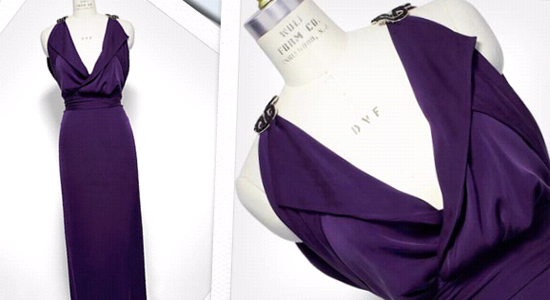
Amex cardholders have exclusive access to purchasing the winning dress designed on the episode of Project Runway that aired on 3 September 2008. The winning dress, judged by Diane von Furstenberg, is currently being sold on dvf.com for USD 650, and cannot be purchased by non-Amex customers.
- When customers of UK mobile phone provider O2 buy an event ticket through the company’s website they can download a Perks Pack which gives them access to specific amenities appropriate to that particular show. For example, the Diva Package (PDF)—available at shows by artists like Tina Turner—includes cocktails and a makeover in the O2 Lounge. O2 also offers priority ticketing.

- In a similar vein, the gigsandtours program from British mobile phone provider Orange allows users to reserve entertainment event tickets using their cell phones up to 48 hours before they go on sale. Music fans can sign up online to receive texts announcing their favourite bands’ upcoming gigs.
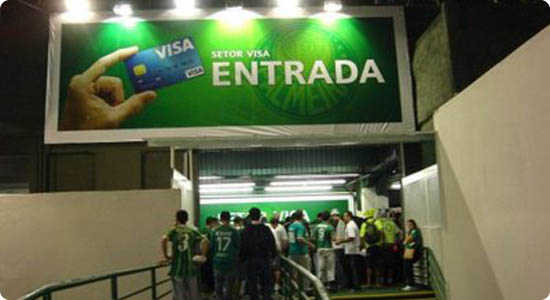
- Palmeiras, one of the major football teams in Brazil, reserves 5,000 seats exclusively for Visa Card customers. Called the 'Visa Sector', the section has a lounge, restaurant, bars, plasma TVs and other perks. But most importantly, it allows fans to buy tickets in advance and without queuing.

- On 10 September 2008, Madonna fans in Chile who belong to both Banco de Chile and mobile company Entel were able to reserve tickets via Ticketmaster two weeks earlier than the general public for the December 2008 Sticky & Sweet shows in Santiago.
Queues are the pedestrian equivalent of no available parking spots. And jumping the queue is one of the biggest time-savers and thus perks around. So ...
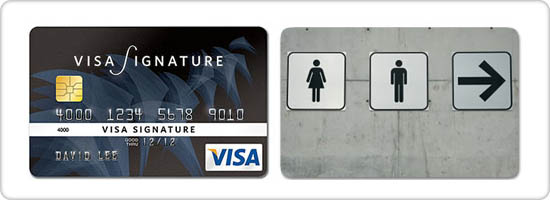
- The Visa Signature Lounge allowed Visa’s preferred customers attending the 2008 Outside Lands Festival in San Francisco access to the VIP experience. Those in possession of a Visa Signature card could use private luxury restrooms—a far cry above the porta-potties provided for the masses—along with a private bar and a free blanket gift for visiting the lounge. For entry, cardholders simply presented their Visa Signature card, their ID and any valid festival ticket.
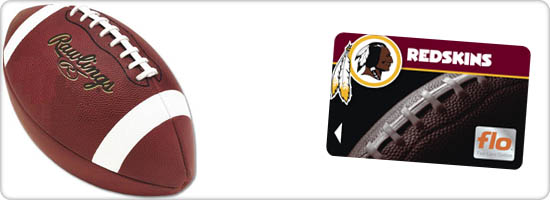
- The Washington Redskins have partnered with FLO, a fast-pass airline security company, to bring Fast Lanes to FedExField football stadium. Starting this fall, Redskins fans can purchase a Fast Lane card for USD 100 that provides premier access to the stadium and expedited security screening at the airport. Similar passes will become available to the Baltimore Ravens in 2009.

- Avis Preferred membership enables car rental customers to skip lines and paperwork and go straight to their car, at over 1,400 locations worldwide. Avis keeps preferred travelers' rental preferences on file and automatically books their car accordingly to minimize hassle.
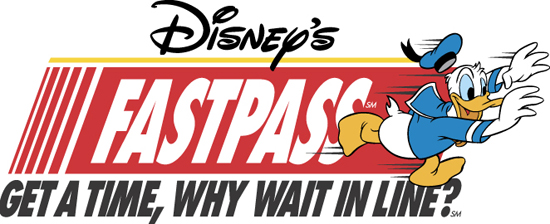
- Note: any kind of jumping-the-queue-perk can’t become a ruse to obscure a lack of efficiency. In other words, you will still have to do whatever you can to make lines shorter for all customers. Learn from Disney: since 1999 Disney’s FASTPASS program has allowed theme park visitors to avoid tedious lines. To reduce wait time on popular rides, visitors insert their parking ticket into a FASTPASS machine and receive a free coupon specifying a specific time to return to that attraction when an attendant will allow them to enter a shorter line.

Domestic outsourcing, butlers, handlers, doormen, PAs, entourages and yes, concierges: to have real people take care of your chores, reservations, repairs, bookings, shopping, deliveries and so on is very 2008 when it comes to luxury. No wonder brands are introducing their own concierge-perks:
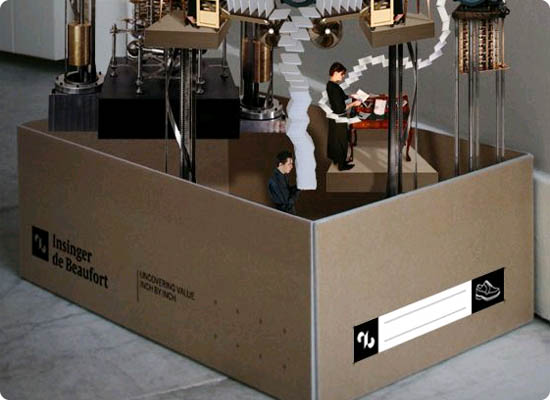
- Amsterdam-based private bank Insinger de Beaufort launched a new service aimed at saving (valuable) clients the time and hassle of dealing with the minutiae of their personal finances. Insinger's clients are sent a big shoebox by courier every month, into which they drop anything admin-related: bills to be paid, bank statements, receipts, tax returns, speeding tickets, insurance documents, etc. At the end of the month, Insinger sends a courier to pick up the box, and then processes its contents. Clients are sent a complete overview of actions and transactions within three business days, after which the bank takes care of the entire follow-up process, including paying bills, filing tax returns and processing business expenses.
- In Brazil, the Tim and Claro cellular phone networks offer their VIP customers a service called "Personal Mobile". Personal consultants instruct VIP customers on how to use their new 1001-feature-filled mobile devices. Also in Brazil, insurance company Porto Seguro offers customers free maintenance services around the house. If a customer’s refrigerator breaks, they can call Porto Seguro and a technician will pay a free house call.

- Best Buy's new elite Premier Black rewards program is still in the testing stage (however, the electronics retailer accidentally sent out an invitation, hence the coverage it's been receiving), but when it's released, it will offer benefits above other levels of Reward Zone memberships, including exclusive shopping services and personal attention from a Premier Black concierge who can help locate out-of-stock products, answer questions, and give special access to the store.

- Chickdowntown.com offers a Preferred Customer Line for shoppers who spend USD 3,500 or more a year. Preferred Customer status provides advice from a Personal Fashion Specialist and special, exclusive promotions.

- South African health insurance company Discovery has a wellness program called Vitality which is the only one of its kind to offer rewards for a healthy lifestyle based on scientific measurement. Members receive points by decreasing risk factors for illness, and the higher the points, the higher the status (bronze, silver, gold, diamond), and the greater the access to shopping and travel discounts.

- As part of the company’s bonus card loyalty program which began in November 2007, Garanti Bank offers a free transportation service for its Bonus Card owners: Bonus Ski Shuttles. Members skiing in popular ski destinations for Istanbulites like Uludag, Kartalkaya and Kartepe can call the Bonus Ski hotline for a van to pick them up at home and drive them to and from their favorite mountain for a discounted price.
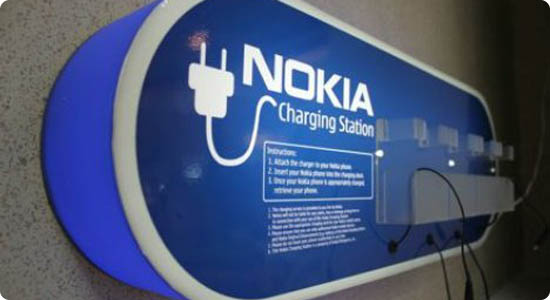
- Nokia in the Philippines has installed phone charging stations for all Nokia users throughout Metro Manila, which Nokia owners can use at no cost.
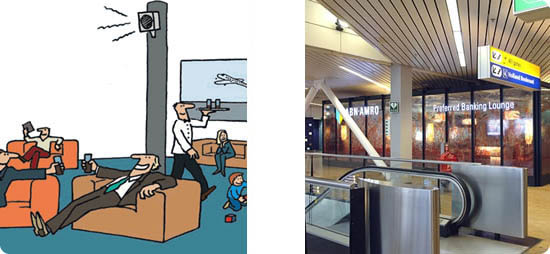
- Business lounges, third spaces, co-working spaces: they’re now an intricate part of the (urban) world outside our homes and offices. So it shouldn’t come as a surprise that brands are opening up their own customer-only lounges. Just one example: ABN AMRO’s Lounge at Schiphol Airport, Amsterdam. Open to Preferred Banking clients from 6am to 10pm, the lounge offers a meeting space, online access, food and beverages, and foreign currency exchange. (Preferred Banking clients have savings or investments exceeding 50,000 euros, and/or a monthly income of at least EUR 5,000.)

- There’s endless life in perks for female travelers. Latest spotting: the Naumi hotel in Singapore, which has set aside an entire floor for women, with designer amenities and female-only staff in order to give the increasing number of women travelers in the Asia-Pacific region a sense of security and privacy in luxurious surroundings. The Ladies' Floor offers in-room cosmetics, aromatherapy products and pink and grey floral wallpaper.
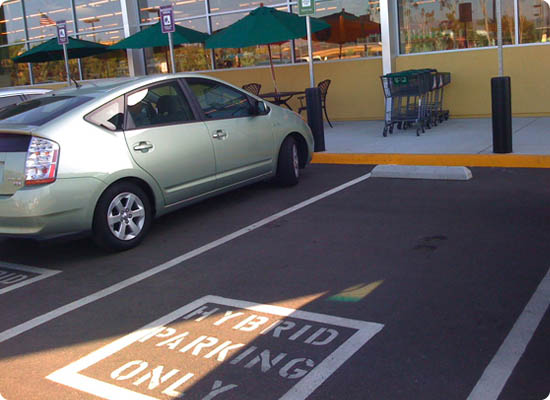
Saving our fave PERKONOMICS examples for last: hassle-free parking within steps of one’s destination, or getting a parking space for free, is priceless, both from a status and convenience perspective:
- Introduced in May 2007, all IKEA stores in Canada feature Green Parking spaces reserved for drivers of hybrid cars and fuel-efficient vehicles. Very ECO-ICONIC too, of course.
Expect the number of preferred parking spots for hybrid vehicles to exponentially increase in the months to come: from other retail stores and hotels, to airports, stadiums, campuses and more. Next? To make sure those businesses are as sustainable as possible, as hybrid parking in order to buy eco-unfriendly goods and services kind of defies the purpose ;-)
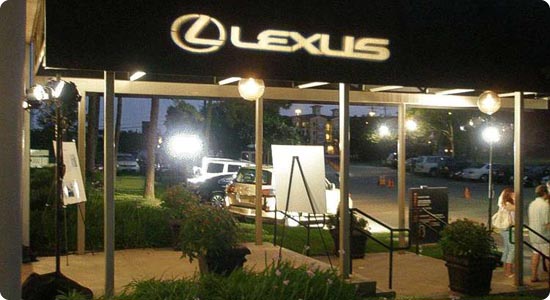
- Lexus offers free parking privileges in a number of locations across the USA, such as Turner Field, home to the Atlanta Braves, where Lexus-driving baseball fans can access free parking. The company is definitely experimenting with PERKONOMICS elsewhere, too: until a while ago, Lexus owners in Australia were entitled to membership of the exclusive Lexus Encore club for the duration of their warranty period. This entitled them to a number of benefits, which included the opportunity for free parking at a number of cultural centers throughout the country, including the Sydney Opera House. More on Lexus' efforts in the 'Opportunities' section of this briefing.
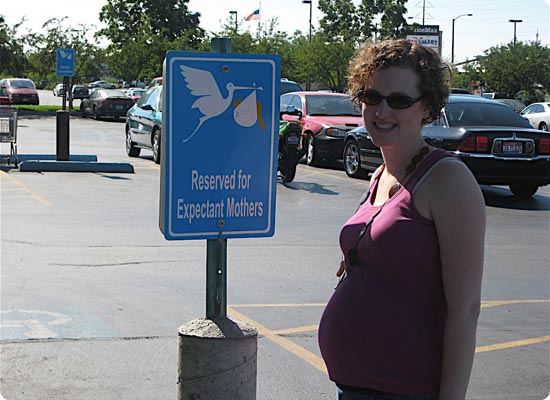
- Babies“R”Us stores introduced reserved parking spaces for expectant mothers years ago; the program now covers 250 stores across the US.
- In Slovenia, Diners Club Black Card holders are given access to the best parking spots at Ljubljana Airport.
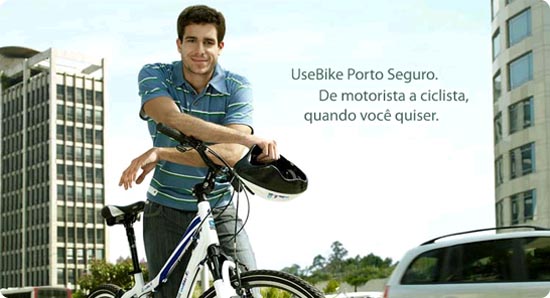
- Another perk from Brazilian insurance company Porto Seguro is offering free bikes to customers who want to avoid Sao Paulo’s heavy traffic. Customers can leave their cars in one of the bank’s affiliated parking places and continue to their destination on bikes that are free to use until they return to pick up their car.
- While the City of London has decided to stop granting free parking privileges to owners of electric cars, other London boroughs like Westminster continue to offer a number of free charging points for electric vehicles as well as free parking.
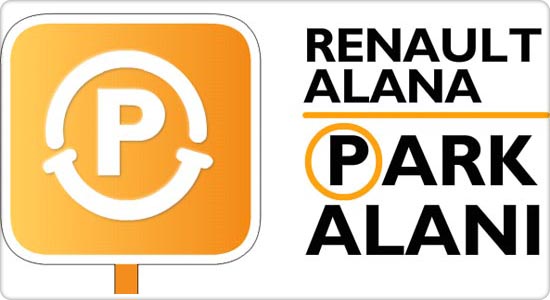
- In May 2007, Renault Turkey made an agreement with ISPARK, a company run by the local government that owns many parking lots in the city, allowing anyone who buys a Renault or Dacia car to use any ISPARK parking lot in the city for free for a year. Officials say the campaign will continue through the end of 2008.

Marketers and PERKONOMICS: kids in a candy store
PERKONOMICS is an aspirational trend; i.e. a trend that generously offers you—marketer, entrepreneur, brand manager—the chance to be a trendsetter, especially if you work in a sector or industry not yet big on perks.
And as perks are about delighting and surprising consumers, you should have no trouble coming up with a few quick ideas that can be implemented immediately and cost-efficiently. Talking about costs: as perks are an integral part of your marketing strategy, shifting a part of your mass-advertising budget to get some PERKONOMICS innovations off the ground is more than justified.

- First of all, for most businesses, PERKONOMICS will be an important sub-trend, not an A-list consumer trend that will change the nature of your business overnight. It also won’t smooth out major issues that brands may be having; if anything, it will enable stable brands to do even better. Yet it isn't a gimmicky trend, either: any new source of inspiration for improving customer satisfaction should be embraced with vigor.
- The ‘new’ perk isn’t about old-school loyalty programs or run-of-the-mill discounts, as those do tend to deliver financial value to customers, but not necessarily the status boost or true convenience we’ve tied PERKONOMICS to.
- Another non-perk: turning previously free, completely accessible services into pseudo-perks, if not paid perks. This is a dubious practice: witness perk-pioneers like airlines now introducing all kinds of payment and perk schemes for simply checking in luggage. The same goes for making previously accessible-to-all customer service only available to top-tier clients.
- Segmentation by tier is fine, but be careful not to alienate your lower-tier customers: keep it aspirational, not dismissive!
- Last but not least, perks are cool to receive, but not cool to have taken away: prepare to be in it for the long run, or clearly communicate the temporary nature of the privileges you’re introducing.
All in all, the best way to approach PERKONOMICS is to dream up genuinely interesting and unexpected benefits and privileges that will delight some or all of your clientele.
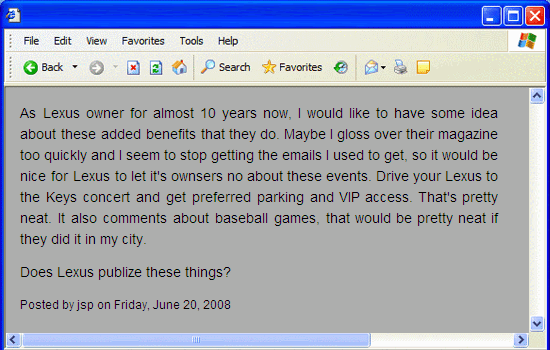
Communicate your perks well!
- Besides all of the benefits we summed up under point 2, there's a chance here to be the first non-airline/hotel/credit card company to really nail this: very few brands seem to have an integrated view, let alone an integrated approach to PERKONOMICS. Even aforementioned brands like Lexus, which rolls out novel perks on an ongoing basis, haven't succeeded in establishing a globally understood PERKONOMICS image, where perks are viewed as an integral part of owning a Lexus.
- And for those of you in the advertising/consulting world: why not start the world's first agency fully dedicated to PERKONOMICS campaigns and projects?
- Check out (again) our BRAND BUTLERS examples here and here. Many of those examples, from Rabobank’s beach lockers to Charmin’s holiday bathrooms, could be given a PERKONOMICS make-over: just limit usage to a brand’s or retailer’s own customers, instead of the general public.
- We could go on and on: try combining CUSTOMER-MADE with perks, in the form of product previews, testing, screening and so on (you will be surprised how many of your most passionate customers will regard a preview of a new product or a service a privilege, not to mention the invaluable feedback it will get you).
- And keep an eye out for a growing number of entrepreneurs that will turn perks into commercial ventures, from business lounges accessible to any traveler willing to pay a fee, to luxury concierge services like Quintessentially and hybrid "phone-meets-concierge" Vertu.
Bottom line: you will have to be creative, and you will need reach out, too. If you want to offer your customers perks outside your own brand-sphere, it means that forging exclusive relationships and partnerships with other brands and personalities has never been a more prized skill.
So ... be the first one to do any of the above well, and reap the benefits.


